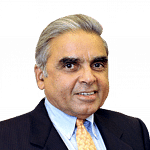Given the clouds of pessimism sweeping across the world, it is a good time to ask a simple question: is global health improving? Conventional wisdom suggests that the answer is no. Data confirms that the answer is yes.
All over the world, people are living longer, fewer babies are dying, hunger is diminishing and more and more people are getting access to modern medicine. Global average life expectancy for both sexes has risen more than 6 years in the past quarter century, from 65.3 years in 1990 to 71.5 years in 2013. The rate of infant mortality has decreased from 63 deaths per 1,000 live births in 1990 to 34 in 2013. This is extraordinary.
I recently attended a conference on universal health coverage in Singapore that included Dr Margaret Chan, the Director-General of the World Health Organisation. She opened the conference by telling some universal coverage success stories from the richest and poorest countries. She described how Singapore had achieved world-class standards in health delivery while spending just 4% of GDP on healthcare. She could have added that the US actually achieved poorer results while spending 18% of its GDP on healthcare.
Singapore's success is well-known. Less well-known is the extraordinary progress made by one of the poorest countries in the world, Bangladesh, a country once described by Henry Kissinger as one of the "basket cases" of the world. Yet, this "basket case" of a country has made extraordinary progress in improving the health of its population. As Dr Chan said, "The Bangladeshi story shatters the long-held assumption that countries must first reduce poverty, then better health will follow almost automatically. Bangladesh decided to reverse the order by first freeing populations from the misery caused by ill health."
Singapore and Bangladesh stand at opposite extremes in terms of per capita income. In 2013, Singapore's GDP per capita was $78,763 (in purchasing power parity terms). In contrast, Bangladesh's was $2,948 - less than 4% of Singapore's. Countries like Malaysia, Sri Lanka and Thailand, so-called "middle-income" countries, have also made extraordinary progress in moving towards universal health coverage.
At the conference, Dr Ravi P. Rannan-Eliya, Executive Director and Fellow of the Institute for Health Policy in Sri Lanka, documented how Malaysia and Sri Lanka had made astonishing progress. They both operate with mixed public and private systems, and this has resulted in high levels of access to medical care, cost savings, and good health outcomes.
Dr Suwit Wibulpolprasert, the well-known mastermind behind Thailand's universal healthcare programme (which has been in effect since 2002), explained the extraordinary strides that Thailand has made. According to Dr Wibulpolprasert, in the early 1940s Thailand had only 50 doctors. By 2010, it had more than 26,000 doctors. In the 1980s, most rural Thai hospitals had only 10 beds. The Thai government has since focused their efforts on building rural health facilities, and now rural hospitals typically have between 30 and 200 beds. The annual prevalence of unmet healthcare needs in Thailand in 2010 was on par with the OECD average at 1.4% for outpatient care and 0.4% for inpatient care. Patients can even claim reimbursement for more than 800 essential drugs, contributing to Thailand's extremely high approval ratings for universal coverage.
A UN working group has proposed that the UN Development Agenda beyond 2015 include the objective of achieving "universal health coverage, including financial risk protection, access to quality essential healthcare services, and access to safe, effective, quality, and affordable essential medicines and vaccines for all". Barely two decades ago, this goal would have been seen as a pipe dream. Now such a dream seems eminently possible.
This first appeared as a blog on the Financial Times website.


